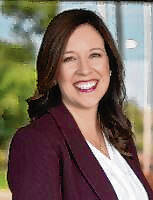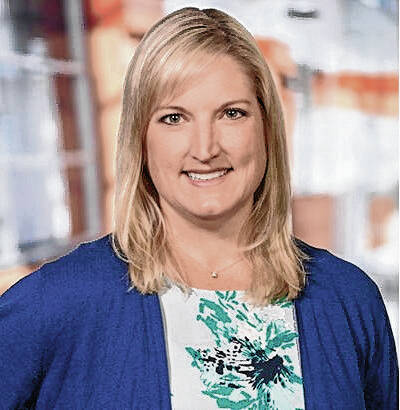Local pediatricians, especially those who are parents of young children, are eager to see the first COVID-19 shots go into the arms of children 5 to 11 years old.
Pediatricians serving Johnson County say their patients’ parents have been asking questions about the vaccines for months, and many have been awaiting this moment since shots were approved for those 12 and older.
The Centers for Disease Control and Prevention recommended the Pfizer vaccine for young children on Tuesday, following unanimous approval from a Food and Drug Administration advisory panel last week.
Pfizer’s vaccine trials demonstrated the vaccine to be 90.7% effective and produce immune responses similar to the level seen in teens and adults, though the dosage for children under 12 is lower.
Vaccinations among this new age group could be a game-changer in the pandemic if parents can be convinced to trust the science, local pediatricians say.
Among patients she sees at Johnson Memorial Health, Dr. Megan Ciaccio sees some parents who are excited about the vaccine, some who say they will never give it to their kids and others who are just looking for someone to tell them the vaccine is safe despite misinformation online.
At Franciscan Health in Greenwood, Dr. Mary Elise Hodson says parents are clamoring to get the vaccine. Dr. Amanda Furr at Community Hospital South is seeing mixed opinions from parents.
All three doctors recommend reaching out to a trusted medical professional with any questions.
Are children at risk for COVID-19?
Mutations introduced by the delta variant make the virus more contagious and more easily spread, especially among the unvaccinated. As more were infected, it became more clear than ever that COVID-19 is capable of causing severe illness in people who were not previously considered at risk, such as children, teens and adults under age 40.
“A lot of people have an opinion that kids don’t get very sick from COVID-19, but they need to realize that we have seen an increase in severe illness,” Hodson said. “It is more than a cold. We are protecting them from potentially going to the hospital and getting very, very sick.”

Before the delta variant, Ciaccio was hesitant to advise all patients to get a COVID-19 vaccine, she said. As a mom of two children under 12, she thought through cost-benefit analysis of the vaccine both at work and at home. With the increased risk for children and the clear effectiveness of the vaccine, the decision was clear, she said.
“I’m more terrified of long-term complications of COVID-19 for my kids than any potential side effects from the vaccine,” Ciaccio said. “At this point, the benefit far outweighs any risk.”
Though children are still less likely to become seriously ill than a person ages 60 or older or a person with underlying conditions, there is still reason to take precautions, doctors say.
“Severe COVID illness is not as common with kids, but kids are not spared,” Furr said. “I have seen kids who were out of school for weeks and were hospitalized in some cases.”
Though it is not 100% effective, the Pfizer vaccine has proven to be effective at preventing severe illnesses if a breakthrough infection occurs, according to the CDC. Those who take the vaccine typically have no symptoms or mild symptoms, the CDC says.
“It is important to recognize the unknowns surrounding COVID and the vaccine,” Ciaccio said. “When you look at what you do know about all of the pediatric deaths from COVID, if there is something we can do to prevent that we should.”
Was the vaccine rushed and is it safe?
The pediatricians are confident in recommending the vaccine. Each said the science behind it is sound. The mRNA technology the Pfizer vaccine was created with has been studied for decades.
The pediatric Pfizer vaccine is just a lower dose of the 12 and older Pfizer vaccine that has been given to millions of people in America and around the world with few serious complications.
The pediatric vaccine is 10 micrograms, compared to the 30-microgram vaccine given to those ages 12 and older. Both vaccines are administered in two doses three weeks apart.
The pediatric vaccine’s safety was studied in approximately 3,100 children and no serious side effects have been reported in the ongoing study, data shows.

Side effects from the pediatric vaccine are similar and slightly milder than those seen in people ages 12 and older, data shows. Common side effects include fever, headache, body aches, all of which typically dissipate within 24 hours.
A study from the Kaiser Family Foundation revealed that 76% of parents who are hesitant about vaccinating their children are hesitant due to unknown, long-term side effects. Doctors encourage parents to rethink those concerns.
Rumors of things such as infertility from the vaccine have been debunked. Whereas there are medically documented long-term effects such as reduced lung function and long COVID that children could spend their whole lives fighting if they are infected.
“There is no reason to believe there are long-term effects,” Furr said. “What we do know is that there are long-term effects from COVID. Adults are getting these and kids are, too.”
The vaccine has not been in use long enough to determine what long-term side effects there will be, but since the vaccine teaches the body’s cells how to respond to the virus, there is no reason to think there would be any, doctors said.
It comes down to trusting the science, Hodson said. Vaccine experts developed the vaccine and experienced, independent medical experts approved them.
“The scientific process is stringent and the vaccines could not have gotten this far without rigorous testing and proving it is safe,” she said.
Why should I vaccinate my child?
Preventing COVID-19 is the obvious reason, but there are other reasons too, doctors say. Chief among them are protecting those at high risk for COVID-19 and keeping kids in school.
“We all want to go back to normal,” Hodson said. “The best way to beat this thing is to get a lot of people vaccinated and get to herd immunity.”
Now, 28 million children across the United States can get vaccinated. With each child vaccinated, a school district has a better chance of staying in school for good, and gets one step closer to eliminating the need to mask up.
“School is so important for kids at this age, not only academically but also socially. So, being able to keep them in school is important,” Furr said. “This is the best shot at doing that.”
Kids can also pass COVID-19 onto people who are at higher risk for a severe outcome, such as a diabetic parent or a grandparent with a heart condition. Furr has seen this firsthand, as some of her patients have lost family members to COVID-19, she said.
“I always remind parents that as important as it is to protect kids, that you are protected, too,” Furr said. “You should get vaccinated as well to make sure you’re around for them.”
Where to get a pediatric vaccine in Johnson County
Compass Park
Where: 690 State St, Franklin.
When: Monday, Tuesday, Thursday Friday 9 a.m. to 4 p.m. Wednesdays 9 a.m. to 6 p.m.
Registration: Walk-in, dial 211 or ourshot.in.gov.
Johnson Memorial Health
Where: Pediatric offices in Franklin and Center Grove.
When: By appointment, during business hours.
Registration: Contact your child’s doctor for an appointment, dial 211 or ourshot.in.gov.
Community Health
Where: Pediatric offices in Greenwood and Indianapolis.
When: By appointment, during business hours.
Registration: Contact your child’s doctor for an appointment, dial 211 or ourshot.in.gov.
Franciscan Health
Where: Pediatric offices in Greenwood and Indianapolis.
When: By appointment, during business hours.
Registration: Contact your child’s doctor for an appointment, dial 211 or ourshot.in.gov.
Windrose Health
Where: 911 E Main Cross St, Edinburgh.
When: Fridays 9 a.m. to 4 p.m.
Registration: Walk-in, dial 211 or ourshot.in.gov.
Adult and Child Health
Where: 1860 Northwood Plaza, Franklin.
Registration: Appointment only. Dial 211 or ourshot.in.gov.





